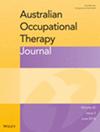‘Occupational experience’ in occupational therapy and occupational science literature: A scoping review
Abstract
Introduction
‘Occupational experience’ (OE) is widely used within the occupational therapy profession. However, it lacks a clear and unified definition in the profession's consensus practice frameworks and seminal models. Therefore, this study aimed to examine how OE has been defined and described in both occupational therapy and occupational science literature.
Methods
A scoping review was performed, with a search conducted in ProQuest, PsycINFO, EMBASE, PubMed, Academic Research Premier, Scopus and Web of Science. The search strategy included a combination of the terms ‘occupational experience’ and either ‘occupational therapy’ or ‘occupational science’. Inclusion criteria consisted of research articles in English that included OE as one of the central foci. Articles were chosen by the research team in collaboration with a medical librarian.
Consumer and Community Involvement
No consumer and community involvement was included in this study.
Results
Seventy-three articles were included, mostly investigating OE in a targeted group or a specific aspect of experience, primarily among Western high-income-countries. Only 14 articles provided definitions of OE, with the most frequent being ‘subjective dimension of occupation/participation’. Six themes emerged: (1) OE as a subjective component of occupation, (2) OE consisting of interrelated experiential facets, (3) OE in relation to meaning, (4) OE in relation to self-identity, (5) OE in relation to context and environment and (6) OE in relation to health outcomes.
Conclusions
The results point to largely incongruous definitions and descriptions of OE in the literature.
PLAIN LANGUAGE SUMMARY
This study looked at how “occupational experience” (OE) is described in occupational therapy and occupational science. We reviewed 73 research articles. Most of these articles focused on OE in specific groups, like asylum seekers, or on types of experiences, like the feeling of “flow.” Most of the research was done in Western countries. The most common definition of OE was “a person's experience of doing an activity.” We also found six main ideas about OE. These show that OE is personal, can include several experiences at once, connects to a person's identity and environment, and affects health.


 求助内容:
求助内容: 应助结果提醒方式:
应助结果提醒方式:


